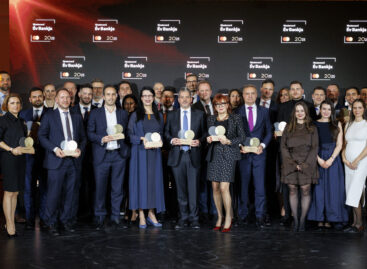The Code and VAT on the menu
A two hour discussion has been held by members of Márkaklub (the Brands Club) and Márkaszövetség (the Brands Association) with invited guests about the conflict evolving in connection with the Product Code and the impact of higher VAT. Trade Magazin: – What does market research data from the first quarter show? Judit Szalóky Tóth: – Food sales were down by only 0,2 percent in terms of quantity which means stagnation rather than decline. Rapid decline is seen in neighbouring countries at present. Average prices have been reduced, with cheaper products and distribution channels producing growth. Categories present in the HoReCa channel have been the worst hit so far. Private labels are producing double digit expansion. The reduction in demand for basic foods has been moderate. A major rearrangement is taking place in the structure of spending in favour of basic foods. The Confidence Index has also improved somewhat. In the HoReCa sector, decline seems to be concentrated n the lower segments. In non-food categories, we can see some surprising trends, like the decline produced by shampoo. Ákos Kozák: This is also a surprise for me, as the opposite has taken place in Germany, with more people washing their hair at home. This shows that no universal trends exist. Ferenc Deák : As CEO of Henkel, I can confirm that we don’t see a big drop in retail sales of hair care products, unlike in the hairdresser market. Á.K.: – According to a survey by GfK, household spending on FMCG products was down by 3.5 percent in the first quarter. The difference between our figures and those of Nielsen is probably due to the fact that we monitor fresh products as well. • T. M.: – What is your forecast for the second half of 2009? J. Sz. T.: – We have to see how VAT will be built into consumer prices. Another 4-5 percent price rise can have a big impact on sales. Á. K.: – The market will show faster decline in terms of value than in terms of quantity, with further growth for PL-s. • T. M.: – Will the shift in politics towards national sentiment have an impact on consumption habits? Á.K.: – Consumer patriotism might be amplified, but such processes cannot be predicted in advance. dr. Márta Nagy: – We still haven’t defined precisely what we mean by “Hungarian product”. Consumer patriotism is not favoured by the EU either. F. D.: – Improvised definitions may lead to all sorts of tricks being worked out. Zoltán Fekete: – There are serious concerns about measuring the shelf space occupied by Hungarian products. • T. M.: – An enquiry was launched by GVH regarding the Code in May, with OKSZ suspending its execution as a result. What do you think about this? dr. M. N : – This could have been avoided if we had been allowed to participate in the preparations. György Vámos : – OKSZ had reservations all along but we were reassured by FVM that experts on competition had been consulted. dr. M. N.: – The ministry says that it has no means to enforce the Code as it has been signed by associations. In any case, no sanctions have been prescribed. Though the Code has provisions which violate the law on competition in theory, these are ineffective, therefor we have no grounds for imposing a fine. Gy.V.: – Ever since the M.E.G.A. Trade scandal, the ministry has been trying to corner retailers by threatening them with inspections and fines. If the Code is only to become partially effective, we should refrain from many costly measures which had originally been intended. This is why we have suspended the execution of the code. • T. M.: – This dispute is sending a negative message to the EU, as similar codes have already been accepted in other countries. V. Gy.: – This is true, but all codes end with the sentence “unless agreed on otherwise by the parties”. dr. N. M.: – And codes usually do not contain provisions limiting competition. • T. M.: Some provisions of the Code have already been in existence in legislation but never enforced successfully. Why would the Code be more effective? Gy. V.: – Unfortunately, legal provisions are based on the assumption that parties complain about violations voluntarily. However, this is not the case, because suppliers are afraid of losing a customer. F. D.: – It would be essential for us to regulate the discounts and other amounts we pay to retailers. We want these to be acknowledged costs at least. • T. M.: – Do you see the change in VAT as having a big impact on consumer prices and demand? Á. K.: – It is certain to have some effect, but I don’t see it as having a major impact on demand. J. Sz. T.: – The same is true in terms of distribution channels. A change in VAT can have a short term effect, but the long term future of a store type depends on other factors. • T. M.: – We have read that retailers want consumers to pay the higher VAT alone… Gy. V.: – They don’t. This is battle in communication. In any case, higher VAT is not a good idea, because it will drive consumers to the illegal market or to do their shopping in neighbouring countries. • Immediately before printing this article, we have received news that a new bill is to be submitted by the parliamentary parties jointly which would no longer require retailers to allocate 80 percent of their shelf space to Hungarian products…
Related news
Related news
Gross from 600 thousand to 1.5 million: numbers also reduce the anxiety of career starters
🎧 Hallgasd a cikket: Lejátszás Szünet Folytatás Leállítás Nyelv: Auto…
Read more >My love is trade marketing – Proven recipes and new waves
🎧 Hallgasd a cikket: Lejátszás Szünet Folytatás Leállítás Nyelv: Auto…
Read more >OTP Bank won the grand prize of the 20th Mastercard – Bank of the Year competition
🎧 Hallgasd a cikket: Lejátszás Szünet Folytatás Leállítás Nyelv: Auto…
Read more >





